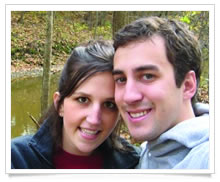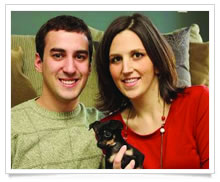by Peter Eckardt
 |
|
Photo courtesy Peter Eckardt |
Megan and I were newlyweds, and we loved it. We loved the excitement of being married and the adventure of living on our own. We loved our cute little apartment. We loved grocery-shopping and making dinners together. We loved playing Cribbage and watching the Food Network. Megan loved me, and I loved her. It was only three months into our loving marriage that Megan became ill and was diagnosed with advanced cholangiocarcinoma (bile duct cancer).
The 17 months that followed were simultaneously some of the best and worst of my life. Some of the best because I was with my sweet Megan, and our love for each other grew stronger than we could have imagined. Some of the worst because the cancer could not be beaten. Despite aggressive chemotherapies, numerous surgeries and procedures, and top-notch doctors and nurses, Megan got sicker and thinner, weaker and quieter until she finally passed away.
Trial and tribulation visited Megan on a daily basis, but she always hoped for the best. We both did. When we were told that the odds of beating this cancer were against her, we hoped that she would beat those odds. When her ovaries had to be removed, we hoped to adopt. When doctors gave her only months to live, we hoped for years. It is often said that being optimistic is essential to one’s physical well-being, but Megan knew that all her dearest hopes and dreams of being cured, having a family, and growing old together were not ultimately what mattered. What really mattered was a different kind of hope altogether. It was the hope of eternal life.
Just one week after Megan was diagnosed, she wrote this on her Caringbridge blog:
“Because God has promised it, I will be blessed with a miracle, whether it be the healing of my body or Christ’s perfect healing.”
Megan knew that Jesus Christ is the Great Physician of both body and soul and that whether He made her well or not, she would attain eternal paradise and, on the Last Day, the resurrection of her body.
But it is not easy to have this kind of hope, though St. Paul urges us saying, “Set your mind on things above, not on things on the earth” (Col. 3:2). It’s much more natural for us to be occupied with our earthly lives than it is to dwell on heavenly things. Indeed, on our own it is impossible to have this kind of hope. Rather, it is a product of faith, which comes only as a gift from God.
This hope sustained Megan through innumerable hardships as the cancer spread throughout her body. In the final weeks of Megan’s life, her kidneys started to fail, keeping her in the hospital for the better part of a month. She was finally able to come home, but Megan’s parents and I had to learn to administer IV fluids to her on a daily basis.
She was so weak, and she took so many pain and nausea medications, that she slept through much of the day. She was also progressively less able to use stairs or walk. One day her legs gave out altogether, and she couldn’t even stand.
Clearly, Megan had come to the point at which there was nothing left on earth that she could reasonably hope for. Death was staring her right in the face.
But she didn’t flinch or shudder; in fact, she was peaceful and content, a testimony, I think, of the grace of God that was in her. Pure grace had taken the place of what, by our standards, should have been despair, anger, fear, or sadness.
 |
|
Photo courtesy Peter Eckardt |
In her last days, Megan no longer had any fight left in her, but by that same grace of God she was also at her bravest then. I believe it was the night before Megan died that I gave in to the emotions that had been welling up inside me without release, and I wept to Megan, telling her how scared I was to lose her. She lay beside me unafraid, her hand in mine, and her thoughts—I suspect—on things above. I was a mess, heartbroken and distressed. She was serene and lovely, full of the grace that God had given her.
I sometimes felt pangs of guilt when I looked at Megan and knew that she wasn’t going to be with me much longer. I believed that God could still cure her if He wanted to, but I had stopped thinking that He would. As I have since reflected on Megan’s passing, it has become clear to me that unshaken optimism is not necessarily something worthy of our endeavor. “Never lose hope!” is only a proper mantra if the hope of eternal life is meant. God does not ask us to run the race of survival; He asks us to run the race of faith.
Megan knew she was dying, but that does not mean that she gave up hope. On the contrary, her hope was in the Lord. These are the sentiments of Psalm 39:
“Lord, make me to know my end,
And what is the measure of my days,
That I may know how frail I am.
Indeed, You have made my days as handbreadths,
And my age is as nothing before You;
Certainly every man at his best state is but vapor.
Surely every man walks about like a shadow;
Surely they busy themselves in vain;
He heaps up riches,
And does not know who will gather them.
And now, Lord, what do I wait for?
My hope is in You” (vs. 4–7).
It is foolish to put our hope in the things of this earthly life. Likewise, if my hope had been only that Megan would beat cancer, how sorely it would have been in vain! The Lord must always be our hope.
Being still on this side of glory, I mourn the loss of my beautiful wife, but I do not sorrow “as others who have no hope.” I thank God that I have true hope, that Megan also had, the hope of everlasting life. “For if we believe that Jesus died and rose again, even so God will bring with Him those who sleep in Jesus” (1 Thess. 4:13–14).
—
About the author: Peter Eckardt is a second-year seminarian at Concordia Theological Seminary, Fort Wayne, Ind.
November 2010





